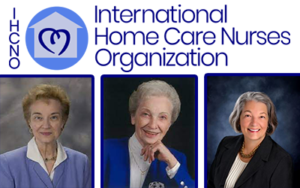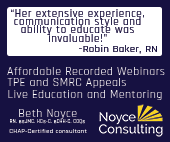By Kristin Rowan, Editor
Last week, I had the honor of speaking with three of the dynamic leaders of the International Home Care Nurses Organization (IHCNO). Between them, they have more than 150 years of nursing and administrative experience. Beyond that, they are some of the most engaging and amazing women I’ve had the pleasure of interviewing.
Meet the Team
Barbara Piskor is the outgoing President of IHCNO. She started working as a nurse in 1964 and has held positions in home health nursing, clinical nursing, administration, national surveying with the Joint Commission, and consulting.
Marilyn Harris is the IHCNO Treasurer. She became a visiting nurse in 1960, was an administrator for the VNA, and spent 20 years as a hospital-based agency administrator.
Susan Hinck is the incoming President of IHCNO. She become a home health nurse in the 1980s and has been a clinician, educator, administrator, and advance practice nurse.
History of IHCNO
IHCNO started as a grassroots organization to serve the care needs of nurses. Between 2009 and 20012, there were concerns about teaching and practice. The industry was expanding and was in need of consistency. This launched the development of a communication network of home care nurses. Their mission is “To communicate, connect, and collaborate with home care nurses around the globe.”
The first members of IHCNO identified then-current home care nurse issues and developed action plans, a committee, and the first international conference event, which was attended by nurses from thirteen countries its inaugural year. They have since added webinars, outreach, and organizational development and are working on developing international guidelines and standards.
The Conversation
Rowan Report: “Barbara, as the outgoing President, what do you hope for the future of IHCNO?”
Barbara Piskor: “For IHCNO to be effective in helping to develop the area of global excellence in home-based nursing. To be recognized as the “go-to” organization for what’s happening in home-0based care related to nursing, from prenatal through to aging in place. To give the message that real health care is in the home; it’s a privilege to be a guest in the home, delivering care. It’s how you get to know the person, their family, and their home situation.
RR: “Susan, as the incoming President, what are your plans and goals for IHCNO for 2024 and beyond?”
Susan Hinck: “IHCNO has always been a volunteer organization, which comes with some challenges. We are contracting with a management company to provide stability and continuity for the organization. The same committed group of people working full0time to grow the organization will benefit from having a management company overseeing logistics so we can focus on additional projects and work more with home care nurses in different countries. There are some countries and continents where home care is not as well developed. For example, South America and Africa have well developed programs for maternity and pediatric home care, but not for older adults.”
RR: “Marilyn, the IHCNO has offers research grants in your name. Tell me about the IHCNO research.”
Marilyn Harris: “The Marilyn D. Harris research grant offers financial support for nurse researchers around the world. After the submission period, applications go through an international review board and one research topic is chosen. In the past, we have funded research on topics like the use of simulation tools in home care and the transition from home care to hospice. This year we will award our sixth research grant.
“We also have a very active internal research department. We are currently studying the scope and standards of home-based nursing around the world. All countries have scope and standards of practice for nursing, but they are not specific to nurses in home-based care. There are a lot of differences in practice across countries.”
RR: “You also have an award program, right?”
Harris: “Yes, that’s right. The Daisy Foundation was established by Bonnie and Mark Barnes to honor their sone. The Daisy award is given to home nurses for extraordinary compassion and care. It’s a worldwide initiative awarded through nomination and blind review. You can find the criteria and nomination forms on our website: https://www.ihcno.org/.”
RR: “Barbara, besides the research, are there other initiatives IHCNO is working on?”
Piskor: “A lot of our focus has been on short-term post-acute care for recovery and rehabilitation. But, custodial care, long-term skilled care, especially for younger adults who need long-term help is one of the fastest growing segments in the home care industry, but it is hampered by reimbursement. Intermittent visit programs are partially covered by Medicare and some Medicaid reimbursement, but isn’t covered by private insurance unless the patient is placed in a nursing home.”
Hinck: “The U.S. can learn a lot from other countries. We spend twice as much on healthcare but are in worse health and have higher mortality rates.”
Piskor: “That’s so true. Another initiative we have is working with provider, practice-based, and educational entities to let people know that home care is a thing. Clinical rotations in home care are necessary in nursing programs. More people need home-based care than ever before and there aren’t enough nursing students aware that home care is an option for them.”
RR: “Susan, IHCNO recently became a membership organization. Can you tell our readers about the member benefits you offer?”
Hinck: “That’s correct. As of January, 2024, IHCNO is a member organization. The biggest benefit of being a member is having a community of nurses to talk to who know what it’s like to be a home care nurse. You can check in and let people know how things are going in your part of the world. We are fostering communication and collaboration among home care nurses around the globe.
“Membership also gets you discounts for IHCNO hosted conferences and webinars and a discount for our multidisciplinary journal Home Health Care Now. We also have individual and corporate-level memberships available.”
RR: “Thank you all for taking the time to share your story with us.”
We will continue to bring you research and news from IHCNO, starting with some of the published works that have come from the past research grant winners. If you have any questions about membership, the grants, the Daisy award nominations, or any of the resources and support available through IHCNO, please reach out to them through their website: https://www.ihcno.org/
# # #

Kristin Rowan has been working at Healthcare at Home: The Rowan Report since 2008. She has a master’s degree in business administration and marketing and runs Girard Marketing Group, a multi-faceted boutique marketing firm specializing in event planning, sales, and marketing strategy. She has recently taken on the role of Editor of The Rowan Report and will add her voice to current Home Care topics as well as marketing tips for home care agencies. Connect with Kristin directly kristin@girardmarketinggroup.com or www.girardmarketinggroup.com
©2024 by The Rowan Report, Peoria, AZ. All rights reserved. This article originally appeared in Healthcare at Home: The Rowan Report.homecaretechreport.com One copy may be printed for personal use: further reproduction by permission only. editor@homecaretechreport.com



